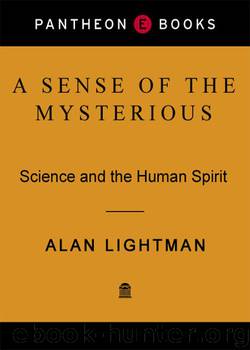A Sense of the Mysterious by Alan Lightman

Author:Alan Lightman
Language: eng
Format: azw3, mobi, epub
Tags: Fiction
ISBN: 9780375423598
Publisher: Knopf Doubleday Publishing Group
Published: 2005-01-18T04:30:00+00:00
HOW MUCH DID Einstein’s temperament, especially his sense of being an outsider, affect his science? Here, of course, one can only point to certain suggestive associations rather than prove causal relationships.
First of all, Einstein used a rare, deductive approach to science. In this he differed from most other scientists of the time, including other theoretical physicists. In the more usual inductive approach, the scientist begins with a number of observations about nature, tries to find a pattern, generalizes the pattern into a “law” or organizing principle, and then tests this law against future experiments. For example, the German astronomer Johannes Kepler examined the data on planets, analyzing the numbers in many different ways, before discovering a striking relationship between a planet’s distance from the sun and the time it takes to complete an orbit. This brief account of the methodological process is certainly oversimplified, and the work is often carried out by an entire community of scientists rather than by a single person. Essentially, however, experiments, data, and observations form both the starting point and the center in inductive science. In deductive science, on the other hand, the scientist begins by postulating certain things to be true, with only secondary guidance from outside experiments, and then deduces the consequences of those postulates. Finally, the consequences are tested experimentally. If the tests fail, the postulates must be changed.
In his Autobiographical Notes (1946), Einstein explicitly credits the philosopher David Hume for having taught him that the truths of nature cannot be arrived at by experience with the world. Rather, one must start with the “free inventions” of the mind. In the case of special relativity, for example, Einstein began with the postulate that the ether did not exist, that absolute motion did not exist, that all unaccelerated observers would measure identical laws of physics; he then derived the consequences of those ideas. Other theoretical physicists of the time, most notably the Dutch Hendrik Antoon Lorentz, proposed detailed theories for how bodies moving through the ether would be electrically compressed in exactly the right amount, depending on their speed, in order to make the experimental results come out as they did. It seems possible that the depth of Einstein’s inner world made him especially attentive to Hume’s teachings and naturally inclined to explore nature from within his own mind.
Download
A Sense of the Mysterious by Alan Lightman.mobi
A Sense of the Mysterious by Alan Lightman.epub
This site does not store any files on its server. We only index and link to content provided by other sites. Please contact the content providers to delete copyright contents if any and email us, we'll remove relevant links or contents immediately.
Enlightenment Now: The Case for Reason, Science, Humanism, and Progress by Steven Pinker(7306)
A Journey Through Charms and Defence Against the Dark Arts (Harry Potter: A Journey Through…) by Pottermore Publishing(4798)
The Immortal Life of Henrietta Lacks by Rebecca Skloot(4571)
A Journey Through Divination and Astronomy by Publishing Pottermore(4378)
Elon Musk by Ashlee Vance(4120)
Origin Story: A Big History of Everything by David Christian(3680)
COSMOS by Carl Sagan(3617)
Alchemy and Alchemists by C. J. S. Thompson(3513)
Bad Pharma by Ben Goldacre(3420)
Enlightenment Now by Steven Pinker(3365)
Shadow of Night by Deborah Harkness(3356)
Inferior by Angela Saini(3311)
A Mind For Numbers: How to Excel at Math and Science (Even If You Flunked Algebra) by Barbara Oakley(3294)
Origin Story by David Christian(3194)
The Code Book by Simon Singh(3177)
Signature in the Cell: DNA and the Evidence for Intelligent Design by Stephen C. Meyer(3125)
The Elements by Theodore Gray(3050)
A Brief History of Time by Stephen Hawking(3022)
A Journey Through Potions and Herbology (A Journey Through…) by Pottermore Publishing(2844)
